medicinal mushroom blend
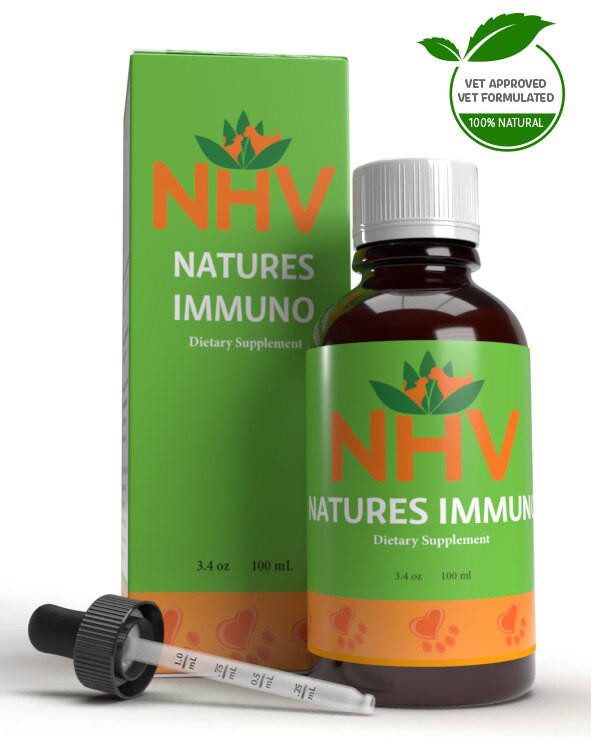
free shipping over $100 (USA & Canada)
1-877-937-4372 the pet expert hotline
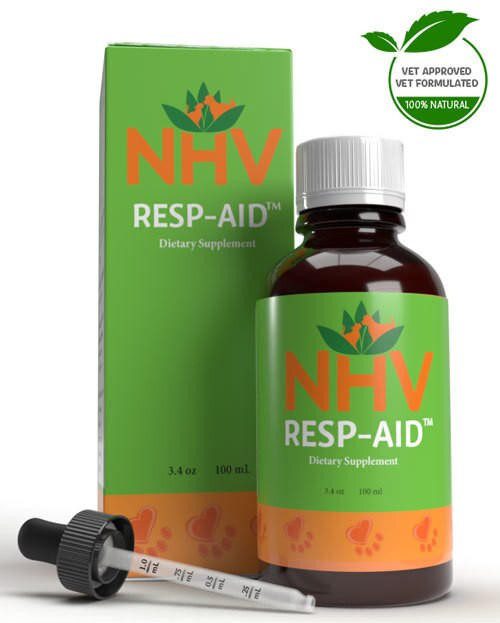
For Coughs, Respiratory Disorders, and Bronchial Infections in Cats

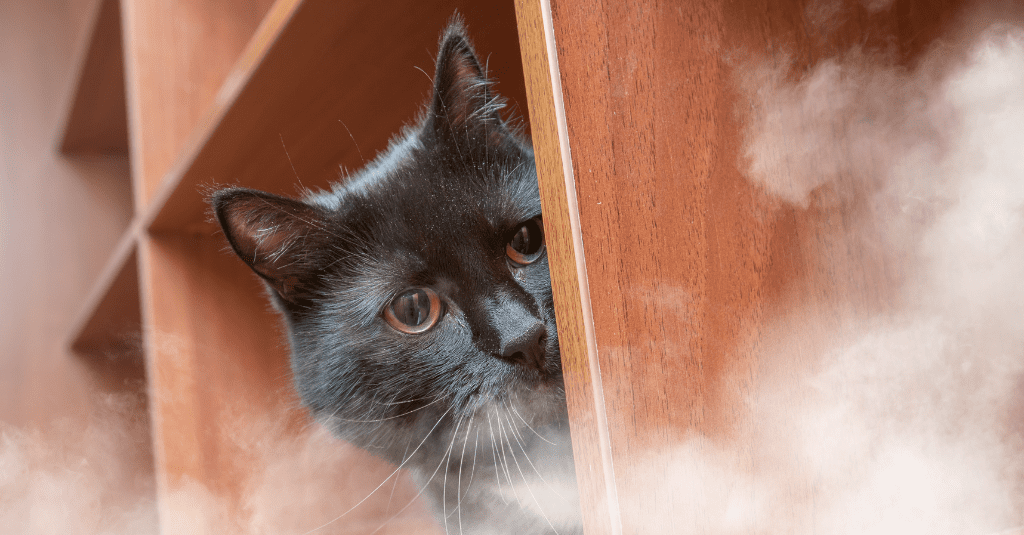
If you live in an area affected by wildfires, you might be thinking to yourself: is smoke bad for dogs and cats? As a responsible and caring pet parent, it’s crucial to be aware of the potential dangers that wildfire season can bring to our furry companions. In this article, we’ll explore the effects of smoke on pets, how to recognize symptoms, the role of supplements, proactive measures to protect your pet, and the treatment of smoke inhalation in dogs and cats.
Just like humans, dogs and cats can be adversely affected by the smoke generated during wildfire events. When a fire is nearby, the air becomes filled with fine particulate matter, chemicals, and irritants. These harmful elements can be inhaled by our pets, leading to respiratory issues, eye irritation, and general discomfort.
These harmful elements can be inhaled by our pets, leading to respiratory issues, eye irritation, and general discomfort.
Keep a close eye on the following symptoms if you suspect your pet is struggling with the poor air quality caused by smoke:
If you suspect that your pet has suffered from smoke inhalation, seeking veterinary care is crucial. The veterinarian will evaluate your pet’s condition, perform necessary tests, and provide appropriate treatment. Treatment may include oxygen therapy, medications to alleviate respiratory distress, nebulization to soothe airways, and supportive care to aid recovery.
Supplements can play a beneficial role in supporting your pet’s respiratory health during periods of smoke exposure. Here are a few supplements that can help:
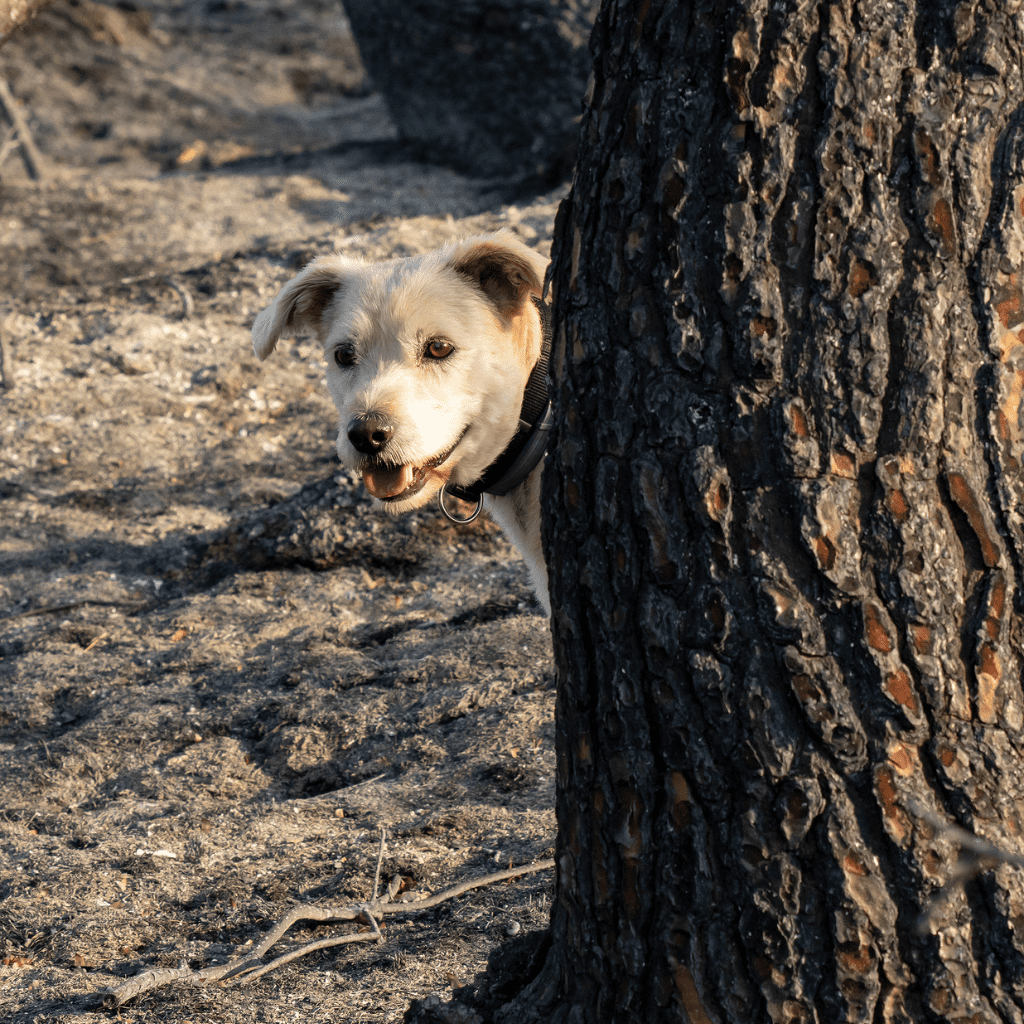
Taking proactive measures is key to protecting your furry friend during the fire season. Here are some steps you can take before anything happens:
If smoke is already present in your area, there are several actions you can take to protect your pet:
Remember, your veterinarian is the best source of guidance and advice specific to your pet’s needs. By staying informed and taking necessary precautions, you can help protect your furry family members during wildfire season.
Next time you hear a neighbor or friend questioning: is smoke bad for dogs and cats? We hope you can pass along your newfound knowledge and help them stay vigilant and prepared to keep everybody safer during this challenging time. Either way, please know that we are always here to help you ensure the safety and well-being of your beloved pets during the wildfire season or any post-emergency care.
medicinal mushroom blend

Vet-Formulated Supplement of Medicinal Mushrooms for Dogs
buy 2 and save $3
3 month supply for a small to medium size pet
Natures Immuno is formulated for dogs from Turkey Tail, Cordyceps, Reishi, Shiitake, and Agaricus mushrooms by a holistic veterinarian and master herbalist. Medicinal mushrooms like these have been used for thousands of years in Chinese medicine as well as traditional herbalism. Researchers around the globe are now studying their potential in helping with cancer, balancing the immune system, and helping with digestive problems and more.

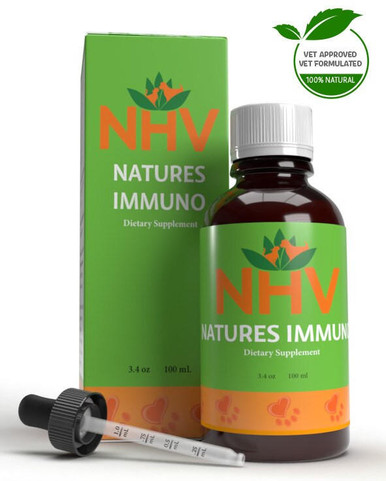
Natures Immuno is formulated for dogs from Turkey Tail, Cordyceps, Reishi, Shiitake, and Agaricus mushrooms by a holistic veterinarian and master herbalist. Medicinal mushrooms like these have been used for thousands of years in Chinese medicine as well as traditional herbalism. Researchers around the globe are now studying their potential in helping with cancer, balancing the immune system, and helping with digestive problems and more.

Natures Immuno Medicinal Mushroom blend for dogs also helps:
Medicinal mushrooms and mushroom extracts are used worldwide to help fight cancer and to help enhance and modulate the immune response of both people and animals. NHV’s mushroom blend contains 5 species of medicinal mushrooms for dogs, which have a long history of use, are well studied, and have been credited with having success against cancer as well as having antioxidant, hypocholesterolemia, anti-tumor, immunomodulatory, anti-allergic, nephroprotective, prebiotic, immunostimulant, anti-inflammatory, cardiovascular, and anti-diabetic properties
Properties of these Medicinal Mushrooms
Benefits of Natures Immuno Medicinal Mushrooms Blend for Dogs
You can read more about medicinal mushrooms for dogs and how they help give added support to pets for cancer and immunity.
NHV carries a wide range of holistic, natural vet-approved remedies that provide support along with a vet-recommended treatment plan. If you have questions about any of our plant-based supplements, ask an NHV expert, because, at NHV, we want your pet to live healthier and longer naturally.
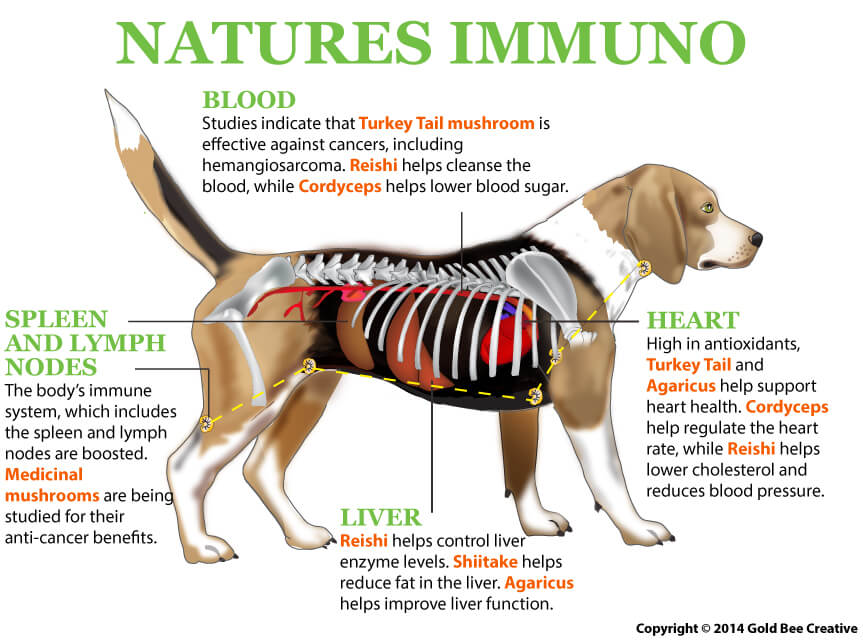
Turkey Tail mushroom is native to Asia, North America, and Europe. It has a long history of use in traditional herbalism and is currently being studied for its health benefits, including its value in fighting cancer. Research has shown that Turkey Tail is beneficial for many types of cancer as it contains properties that help fight cancer cells while helping to strengthen the immune system. Turkey tail mushroom for dogs has shown to be beneficial in spleen and liver hemangiosarcoma in dogs. It is also useful for heart health, lowering cholesterol, digestive issues, and skin problems.
Cordyceps mushroom is very rich in phytonutrients. Research has indicated that these mushrooms demonstrate anti-tumor, immune enhancing and hypoglycemic activity. It has anti-inflammatory, antioxidant, anti-tumor, anti-cancer, antimetastatic, and antiviral properties. It is very useful for diabetes as it helps lower blood sugar. Cordyceps also help enhance lymphocyte activity, which balance the immune system.
Reishi mushroom has been used for thousands of years in traditional Chinese medicine. It helps detoxify the blood, helps lower cholesterol and reduces blood pressure. It is also beneficial for the lymphatic system, which helps with a dog’s immunity.
Shiitake mushroom is a popular ingredient in cooking and is highly valued in traditional herbalism for its immune stimulating properties. It helps reduce fat in the liver, helps lower cholesterol, and is beneficial for heart health as it aids in reducing plaque in the arteries. Shiitake may help inhibit the growth of leukemia cells. Shiitake is also a good source of protein, vitamins, and minerals.
Agaricus mushroom is cultivated widely for dietary supplements and culinary purposes. Agaricus is useful for bone health, and helps with insulin production and helps with liver function. Agaricus is considered an adaptogen, which helps combat stress and supports the endocrine functions. This mushroom is currently used in Japan as an adjunctive with chemotherapy treatments.
Select your pet's weight to determine the correct dose.
To be taken twice daily.
Determine your pet’s weight and then use the easy chart below to determine the correct dose. You can safely double the recommended dosage.
Pet's Weight Dosage
0 - 15 lb 0.5 mL
16 - 30 lb 1.0 mL
31 - 45 lb 1.5 mL
46 - 60 lb 2.0 mL
61 - 75 lb 2.5 mL
Over 75 lb 3.0 mL
For small animals (rabbits, ferrets), avians and reptiles use 1 drop for every 2 lb of body weight.
How to Administer
Shake well before use. The easiest method is to use the dropper provided and place the drops into your pet’s food or favorite treat. You can also use the dropper and squirt directly into the pet’s mouth. Some pets can be finicky, if this occurs consider hiding the drops in foods most pet’s love such as fish, chicken, yogurt, or a favorite treat. If your pet only eats dry food then soak a few kibbles at feeding time.
For Best Results
Herbal dietary supplements are beneficial to the health and well-being of your pet and are safe for long-term use. Every pet responds to natural herbal supplements differently, therefore it is important to be consistent and administer the product daily. Supplements generally take two to four weeks to take effect, however this will vary from one animal to the next.
Product Storage
All NHV Natural Pet Products are pure herbal extracts and contain no artificial additives, preservatives or coloring. Shelf life after opening is 6 months and must be refrigerated after opening.
Natures Immuno Medicinal Mushroom blend for dogs also helps:
Medicinal mushrooms and mushroom extracts are used worldwide to help fight cancer and to help enhance and modulate the immune response of both people and animals. NHV’s mushroom blend contains 5 species of medicinal mushrooms for dogs, which have a long history of use, are well studied, and have been credited with having success against cancer as well as having antioxidant, hypocholesterolemia, anti-tumor, immunomodulatory, anti-allergic, nephroprotective, prebiotic, immunostimulant, anti-inflammatory, cardiovascular, and anti-diabetic properties
Properties of these Medicinal Mushrooms
Benefits of Natures Immuno Medicinal Mushrooms Blend for Dogs
You can read more about medicinal mushrooms for dogs and how they help give added support to pets for cancer and immunity.
NHV carries a wide range of holistic, natural vet-approved remedies that provide support along with a vet-recommended treatment plan. If you have questions about any of our plant-based supplements, ask an NHV expert, because, at NHV, we want your pet to live healthier and longer naturally.

Turkey Tail mushroom is native to Asia, North America, and Europe. It has a long history of use in traditional herbalism and is currently being studied for its health benefits, including its value in fighting cancer. Research has shown that Turkey Tail is beneficial for many types of cancer as it contains properties that help fight cancer cells while helping to strengthen the immune system. Turkey tail mushroom for dogs has shown to be beneficial in spleen and liver hemangiosarcoma in dogs. It is also useful for heart health, lowering cholesterol, digestive issues, and skin problems.
Cordyceps mushroom is very rich in phytonutrients. Research has indicated that these mushrooms demonstrate anti-tumor, immune enhancing and hypoglycemic activity. It has anti-inflammatory, antioxidant, anti-tumor, anti-cancer, antimetastatic, and antiviral properties. It is very useful for diabetes as it helps lower blood sugar. Cordyceps also help enhance lymphocyte activity, which balance the immune system.
Reishi mushroom has been used for thousands of years in traditional Chinese medicine. It helps detoxify the blood, helps lower cholesterol and reduces blood pressure. It is also beneficial for the lymphatic system, which helps with a dog’s immunity.
Shiitake mushroom is a popular ingredient in cooking and is highly valued in traditional herbalism for its immune stimulating properties. It helps reduce fat in the liver, helps lower cholesterol, and is beneficial for heart health as it aids in reducing plaque in the arteries. Shiitake may help inhibit the growth of leukemia cells. Shiitake is also a good source of protein, vitamins, and minerals.
Agaricus mushroom is cultivated widely for dietary supplements and culinary purposes. Agaricus is useful for bone health, and helps with insulin production and helps with liver function. Agaricus is considered an adaptogen, which helps combat stress and supports the endocrine functions. This mushroom is currently used in Japan as an adjunctive with chemotherapy treatments.
Select your pet's weight to determine the correct dose.
To be taken twice daily.
Determine your pet’s weight and then use the easy chart below to determine the correct dose. You can safely double the recommended dosage.
Pet's Weight Dosage
0 - 15 lb 0.5 mL
16 - 30 lb 1.0 mL
31 - 45 lb 1.5 mL
46 - 60 lb 2.0 mL
61 - 75 lb 2.5 mL
Over 75 lb 3.0 mL
For small animals (rabbits, ferrets), avians and reptiles use 1 drop for every 2 lb of body weight.
How to Administer
Shake well before use. The easiest method is to use the dropper provided and place the drops into your pet’s food or favorite treat. You can also use the dropper and squirt directly into the pet’s mouth. Some pets can be finicky, if this occurs consider hiding the drops in foods most pet’s love such as fish, chicken, yogurt, or a favorite treat. If your pet only eats dry food then soak a few kibbles at feeding time.
For Best Results
Herbal dietary supplements are beneficial to the health and well-being of your pet and are safe for long-term use. Every pet responds to natural herbal supplements differently, therefore it is important to be consistent and administer the product daily. Supplements generally take two to four weeks to take effect, however this will vary from one animal to the next.
Product Storage
All NHV Natural Pet Products are pure herbal extracts and contain no artificial additives, preservatives or coloring. Shelf life after opening is 6 months and must be refrigerated after opening.
respiratory support
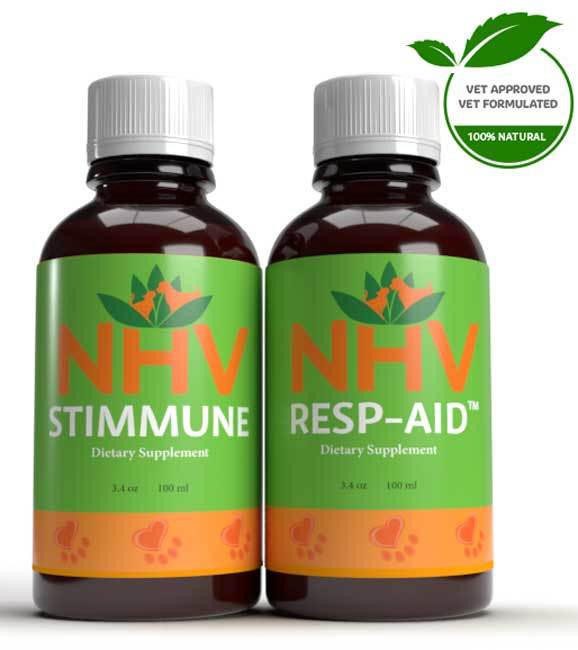
Resp-Aid™ & Stimmune
bundle and save with pet expert kits
3 month supply for a small to medium size pet.
Is asthma in cats or dogs a concern for you and your furry little one? That constant coughing and difficulty breathing can definitely be hard on them. That’s why pet parents should provide extra support however they can. NHV’s Asthma Kit For Respiratory Relief may help as it contains our primary dog and cat asthma natural remedies: Resp-Aid™ and Stimmune. Together, they help to support asthma symptoms like respiratory discomfort, may help reduce inflammation in the airways, and support furkiddos’ immune systems


Is asthma in cats or dogs a concern for you and your furry little one? That constant coughing and difficulty breathing can definitely be hard on them. That’s why pet parents should provide extra support however they can. NHV’s Asthma Kit For Respiratory Relief may help as it contains our primary dog and cat asthma natural remedies: Resp-Aid™ and Stimmune. Together, they help to support asthma symptoms like respiratory discomfort, may help reduce inflammation in the airways, and support furkiddos’ immune systems

Seeing your little one having trouble breathing and constantly coughing and sneezing is worrying. What can you do to help support them? NHV’s Asthma Kit For Respiratory Relief may help soothe asthma symptoms, alleviate the swelling caused by allergens, and strengthen your furkid’s immune system. This bundle contains Resp-Aid™ and Stimmune.
All our supplements are safe for long-term use and liquid-based, so you can simply give it to them by mouth or mixing it into their meals.
Asthma in cats and dogs is a respiratory condition resulting from an allergic reaction. It happens when your furkid inhales an allergen, which causes the airways of their lungs to inflame and narrow. Consequently, it becomes more difficult for our furriends to breathe.
Asthma in cats will affect around 1-5% of our kitty friends. Even though asthma in dogs is more uncommon, our pups can also suffer from asthma attacks. Small and middle-aged dogs are usually at the highest risk for this condition.
Besides difficulty breathing, this recurring inflammation also results in various other symptoms:
If you notice these asthma signs, your little one is likely to have asthma. Please visit a vet immediately for a full body examination and a correct diagnosis. An earlier diagnosis can help your furkid get the right treatment sooner.
On top of the traditional cat and dog asthma medicine, NHV herb-based supplements like the ones in our Asthma Kit For Respiratory Relief can also assist your furkiddo on their road to recovery.
Resp-Aid™ is a vet-formulated extract designed to help furkiddos with respiratory issues. The unique blend of herbs helps support the symptoms of asthma. For example, herbs like Coltsfoot help keep coughs under control. Lobelia and Horehound may also help relieve spasms and reduce mucus accumulation.
In addition, this supplement helps soothe irritating tissues in furkids’ lungs and has powerful anti-inflammatory properties.
Since asthma is usually caused by furkids breathing in allergens, we also added our primary support for allergy, Stimmune, to the kit. This formula of herbal extracts can help balance your little one’s immune system, regulating their body’s reaction to external allergens.
On top of that, Echinacea Purpurea and Myrrh can help relieve irritation and inflammation. The supplement may also help increase the energy of your little one.
NHV supplements are all 100% natural and herb-based, including the ones in this kit. A holistic veterinarian and master herbalist with a combined 50+ years of experience formulating every extract.
If you have any questions regarding asthma in cats and dogs or anything else, feel free to reach out to one of our supportive Pet Experts! We are always here to help!
Help your furkid with asthma now by ordering our Asthma Kit For Respiratory Relief.
All NHV supplements are made with the finest quality organic or ethically harvested herbs. We use non-GMO vegetable glycerin as our base. NHV products are full-spectrum extracts.
Select your pet's weight to determine the correct dose.
To be taken twice daily. Determine your pet’s weight and then use the easy chart below to determine the correct dose. This is the minimum dosage.
Pet's Weight Dosage
0 - 15 lb = 0.5 ml
16 - 30 lb = 1.0 ml
31 - 45 lb = 1.5 ml
46 - 60 lb = 2.0 ml
61 - 75 lb = 2.5 ml
Over 75 lb = 3.0 ml
How to Administer
Shake well before use. The easiest method is to use the dropper provide and places the drops into your pet’s food or favorite treat. You can also use the dropper and squirt directly into the pet’s mouth.
Some pets can be finicky, if this occurs consider hiding the drops in foods most pet’s love such as fish, chicken or yogurt or a favorite treat. If your pet only eats dry food then soak a few kibbles at feeding time.
For Best Results
Herbal dietary supplements are beneficial to the health and wellbeing of your pet and are safe for long-term use. Every pet responds to natural herbal supplements differently, therefore it is important to be consistent and administer the product daily. Supplements generally take two to four weeks to take effect, however this will vary from one animal to the next.
Product Storage
All NHV Natural Pet Products are pure herbal extracts and contain no artificial additives, preservatives or coloring. Shelf life after opening is 6 months and must be refrigerated after opening.
Cautions and Contraindications: Do not use Turmeric in pregnant or nursing animals. Speak to your vet before using our products. A second visit is recommended if your pet’s condition does not improve, or deteriorates after continued use of the supplements.
Seeing your little one having trouble breathing and constantly coughing and sneezing is worrying. What can you do to help support them? NHV’s Asthma Kit For Respiratory Relief may help soothe asthma symptoms, alleviate the swelling caused by allergens, and strengthen your furkid’s immune system. This bundle contains Resp-Aid™ and Stimmune.
All our supplements are safe for long-term use and liquid-based, so you can simply give it to them by mouth or mixing it into their meals.
Asthma in cats and dogs is a respiratory condition resulting from an allergic reaction. It happens when your furkid inhales an allergen, which causes the airways of their lungs to inflame and narrow. Consequently, it becomes more difficult for our furriends to breathe.
Asthma in cats will affect around 1-5% of our kitty friends. Even though asthma in dogs is more uncommon, our pups can also suffer from asthma attacks. Small and middle-aged dogs are usually at the highest risk for this condition.
Besides difficulty breathing, this recurring inflammation also results in various other symptoms:
If you notice these asthma signs, your little one is likely to have asthma. Please visit a vet immediately for a full body examination and a correct diagnosis. An earlier diagnosis can help your furkid get the right treatment sooner.
On top of the traditional cat and dog asthma medicine, NHV herb-based supplements like the ones in our Asthma Kit For Respiratory Relief can also assist your furkiddo on their road to recovery.
Resp-Aid™ is a vet-formulated extract designed to help furkiddos with respiratory issues. The unique blend of herbs helps support the symptoms of asthma. For example, herbs like Coltsfoot help keep coughs under control. Lobelia and Horehound may also help relieve spasms and reduce mucus accumulation.
In addition, this supplement helps soothe irritating tissues in furkids’ lungs and has powerful anti-inflammatory properties.
Since asthma is usually caused by furkids breathing in allergens, we also added our primary support for allergy, Stimmune, to the kit. This formula of herbal extracts can help balance your little one’s immune system, regulating their body’s reaction to external allergens.
On top of that, Echinacea Purpurea and Myrrh can help relieve irritation and inflammation. The supplement may also help increase the energy of your little one.
NHV supplements are all 100% natural and herb-based, including the ones in this kit. A holistic veterinarian and master herbalist with a combined 50+ years of experience formulating every extract.
If you have any questions regarding asthma in cats and dogs or anything else, feel free to reach out to one of our supportive Pet Experts! We are always here to help!
Help your furkid with asthma now by ordering our Asthma Kit For Respiratory Relief.
All NHV supplements are made with the finest quality organic or ethically harvested herbs. We use non-GMO vegetable glycerin as our base. NHV products are full-spectrum extracts.
Select your pet's weight to determine the correct dose.
To be taken twice daily. Determine your pet’s weight and then use the easy chart below to determine the correct dose. This is the minimum dosage.
Pet's Weight Dosage
0 - 15 lb = 0.5 ml
16 - 30 lb = 1.0 ml
31 - 45 lb = 1.5 ml
46 - 60 lb = 2.0 ml
61 - 75 lb = 2.5 ml
Over 75 lb = 3.0 ml
How to Administer
Shake well before use. The easiest method is to use the dropper provide and places the drops into your pet’s food or favorite treat. You can also use the dropper and squirt directly into the pet’s mouth.
Some pets can be finicky, if this occurs consider hiding the drops in foods most pet’s love such as fish, chicken or yogurt or a favorite treat. If your pet only eats dry food then soak a few kibbles at feeding time.
For Best Results
Herbal dietary supplements are beneficial to the health and wellbeing of your pet and are safe for long-term use. Every pet responds to natural herbal supplements differently, therefore it is important to be consistent and administer the product daily. Supplements generally take two to four weeks to take effect, however this will vary from one animal to the next.
Product Storage
All NHV Natural Pet Products are pure herbal extracts and contain no artificial additives, preservatives or coloring. Shelf life after opening is 6 months and must be refrigerated after opening.
Cautions and Contraindications: Do not use Turmeric in pregnant or nursing animals. Speak to your vet before using our products. A second visit is recommended if your pet’s condition does not improve, or deteriorates after continued use of the supplements.
overall vitality

For Overall Health and Well-Being
buy 2 and save $3
An Omega 3 supplement for cats to support their joints, heart, eyes, immune system, and overall organ function.


An Omega 3 supplement for cats to support their joints, heart, eyes, immune system, and overall organ function.

Our cat omega 3 supplement is naturally made from the oils of sardines, anchovies, and North Atlantic cod. It’s an excellent source of EPA (Eicosapentaenoic Acid 600mg) and DHA (Docosahexaenoic acid 460mg) essential omega 3 fatty acids. It’s molecularly distilled and cold-pressed to improve the bioavailability
Support your cat with human-grade quality omega 3 fish oil supplements. Many processed pet foods are deficient in this important nutrient. And according to the University of Maryland Medical Center, "It is very important to maintain a balance between omega-3 and omega-6 fatty acids in the diet. A proper balance helps maintain and even improve health."
It’s important for cats to get essential fatty acids through their diet. This omega 3 supplement for cats will help keep them healthy, and even finicky cats actually like to take it.
Benefits of Cat omega 3 supplements:
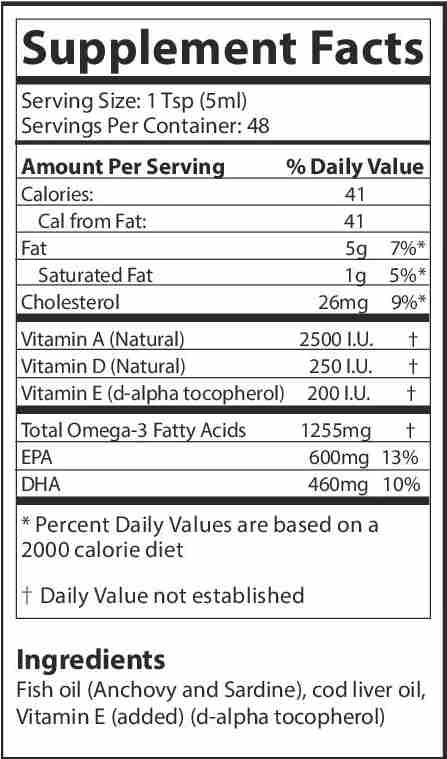
Suggested Dosage: To be taken once per day. Add to food based on weight chart.
Therapeutic Dosage: Double the quantity for maximum period of 4 weeks or follow veterinarian advise.
Pet’s Weight Dosage
0-15 lb = ¼ tsp
15-30 lb = ½ tsp
30-60 lb = 1 tsp
60-90 lb = 1 ½ tsp
How to Administer: Shake well before use. The easiest method is to add the dosage to your pets food. Some pets can be finicky, if this occurs consider hiding the appropriate amount in food most pet’s love such as fish, chicken, yogurt, or a favorite treat. If your pet only eats dry food then soak kibbles at feeding time.
For Best Results
Dietary supplements are beneficial to the health and well-being of your pet and are safe for long-term use. Every pet responds to natural supplements differently, therefore it is important to be consistent and administer the product daily. Supplements generally take two to four weeks to take effect, however this will vary from one animal to the next.
Product Storage
All NHV Natural Pet Products contain no artificial additives, preservatives or coloring. Shelf life after opening is 6 months and must be refrigerated after opening.
Cautions and Contraindications
Avoid During Pregnancy.
Our cat omega 3 supplement is naturally made from the oils of sardines, anchovies, and North Atlantic cod. It’s an excellent source of EPA (Eicosapentaenoic Acid 600mg) and DHA (Docosahexaenoic acid 460mg) essential omega 3 fatty acids. It’s molecularly distilled and cold-pressed to improve the bioavailability
Support your cat with human-grade quality omega 3 fish oil supplements. Many processed pet foods are deficient in this important nutrient. And according to the University of Maryland Medical Center, "It is very important to maintain a balance between omega-3 and omega-6 fatty acids in the diet. A proper balance helps maintain and even improve health."
It’s important for cats to get essential fatty acids through their diet. This omega 3 supplement for cats will help keep them healthy, and even finicky cats actually like to take it.
Benefits of Cat omega 3 supplements:

Suggested Dosage: To be taken once per day. Add to food based on weight chart.
Therapeutic Dosage: Double the quantity for maximum period of 4 weeks or follow veterinarian advise.
Pet’s Weight Dosage
0-15 lb = ¼ tsp
15-30 lb = ½ tsp
30-60 lb = 1 tsp
60-90 lb = 1 ½ tsp
How to Administer: Shake well before use. The easiest method is to add the dosage to your pets food. Some pets can be finicky, if this occurs consider hiding the appropriate amount in food most pet’s love such as fish, chicken, yogurt, or a favorite treat. If your pet only eats dry food then soak kibbles at feeding time.
For Best Results
Dietary supplements are beneficial to the health and well-being of your pet and are safe for long-term use. Every pet responds to natural supplements differently, therefore it is important to be consistent and administer the product daily. Supplements generally take two to four weeks to take effect, however this will vary from one animal to the next.
Product Storage
All NHV Natural Pet Products contain no artificial additives, preservatives or coloring. Shelf life after opening is 6 months and must be refrigerated after opening.
Cautions and Contraindications
Avoid During Pregnancy.
Published: July 12, 2023